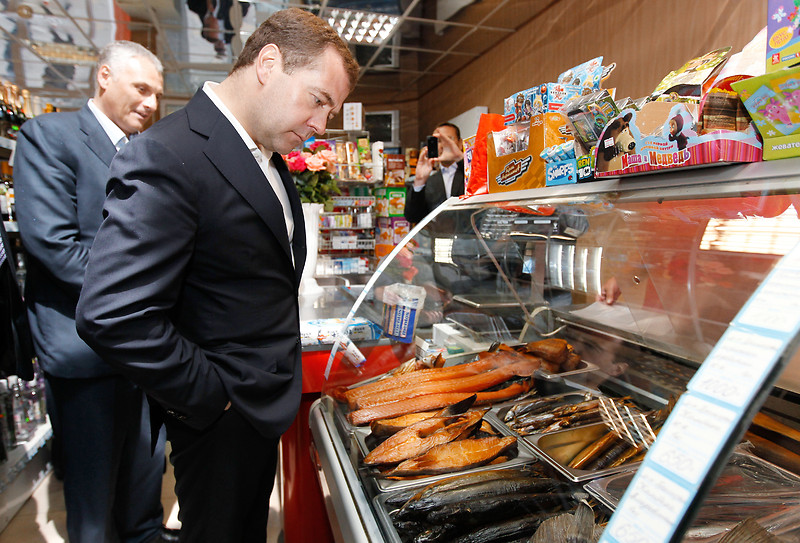
In Escalating Standoff With West, Russia Imposes Food Ban
Publication: Eurasia Daily Monitor Volume: 11 Issue: 145
By:

In reply to Western sanctions over the Ukrainian crisis, the Russian government has announced a sweeping ban on the import of meat and meat products, fish and sea food, cheese, milk and milk products, as well as fruit and vegetables from the United States, the European Union, Australia, Canada and Norway. The ban has been imposed for a year; it could be prolonged or lifted, depending on whether the US and the EU continue to enforce their own sanctions. The list of banned food exports was signed by Prime Minister Dmitry Medvedev in accordance with a presidential decree (ukaz) by President Vladimir Putin. Medvedev promised to ensure the ban will not result in the growth of consumer retail prices and “all attempts to profit through speculation will be dealt with.” Medvedev expressed hope “the ban will bring Russia much good—the shelves in our malls will be cleared and filled with Russian produce—we must not miss such an opportunity to expand import replacement [importozamescheniye]” (Interfax, August 7).
In addition, Ukrainian airlines have been banned from using transit flight corridors over Russian territory. According to Medvedev, “the government is considering to ban US and European airlines from using trans-Siberian transit air corridors to the Asia-Pacific region.” The government is also considering restricting US and EU civilian air traffic en route in and out of Russia. According to Medvedev, the trans-Siberian transit air corridor ban “will cost Western airlines a lot.” The partial closure of Russian airspace to Western civilian air traffic is, the prime minister noted, a retaliation for EU sanctions against low-cost airline Dobrolyot—a subsidiary of state-controlled Aeroflot that was flying regular flights to Russian-annexed Crimea. EU sanctions forced Dobrolyot to cancel operations as of August 4 (Interfax, August 7).
The ban on food imports and the possible ban on trans-Siberian transit air flights will surely damage Western interests, but also inevitably backfire in Russia. Russia imported some $43 billion worth of food and food substances in 2013—of them, over $15 billion came from the US, the EU, Australia, Canada and Norway (excluding alcohol and tobacco). Some $4 billion to $5 billion worth of food imports may now be banned, which will surely affect the Russian population, especially in big cities like Moscow. Prices may rise and many items disappear from mall shelves. Russia does not have the know-how or the infrastructure to keep and distribute fruit and vegetables during the long winter; the Russian fish and sea food industry as well as the Russian dairy industry are too underdeveloped to effectively take over the market freed from Western producers. Moscow hopes to cover the emerging gap by importing more from Brazil, Israel, Turkey, China and other Asian nations, while rapidly developing its own food production. Some form of internal price control may be introduced. Belarus has promised to increase dairy imports and may indeed become a channel to smuggle banned food stuffs into Russia from Europe (Kommersant, August 7).
The EU is expected to retaliate for Russia’s food ban by initiating the World Trade Organization (WTO) trade dispute settlement process, which may take years to complete. The Russian authorities reportedly hope that before the WTO reaches a decision to compel Moscow to rescind the food import ban, Russian producers may already have massively expanded their hold on the market—achieving the much desired goal of “import replacement” or self-sustainability. Apparently, the Kremlin suspects the West of preparing to use Russia’s dependence on imported food as a weapon “in the coming months,” and the food ban is a preventive measure to force local producers to begin “import replacement” in earnest (Kommersant, August 7). The minister of agriculture, Nikolai Fedorov, told journalists in Moscow: “Russia’s agriculture sector will increase production in a year and half by 281 billion rubles [$7.8 billion] as a result of sanctions” (Interfax, August 7).
The self-imposed food ban may cause shortages, price hikes and consumer discontent. Whereas, the ban on trans-Siberian air transit could result in Western tit-for-tat retaliations, such as the restriction of Russian airline use of Western airspace, possibly grounding Aeroflot and other Russian majors. In January 2014, Russian airlines were using 703 foreign-made and 321 Russian-made jets. Most of the foreign-made jets were on lease from Western companies. If the same sanctions that hit Dobrolyot are imposed on Aeroflot and other Russian major airlines, they could lose at least half of their jet passenger fleet and will have serious problems properly insuring and maintaining the rest (Novaya Gazeta, August 6).
The Kremlin is apparently ready to up the ante for a costly escalation in its standoff with the West over Ukraine. Moscow has disclaimed as rubbish Western reports about a pending direct invasion of Russian troops in the fighting in Donbas between Ukrainian government troops and pro-Russian rebels. The Russian defense ministry has insisted that massive air and anti-aircraft forces exercises, which are being conducted this week in the south of Russia, have nothing to do with the situation in Ukraine (RIA Novosti, August 6). Russian special forces have also been conducting exercises in the country’s south (the South Military District) this week, which Moscow may equally try to explain away as a coincidence (rbc.ru, August 5). Meanwhile, the Ukrainian forces are tightening their siege of Donetsk, the capital of the pro-Russia separatists. The rebels told Russian media they have abandoned one of Donetsk’s suburbs, Marinka, after heavy fighting (RIA Novosti, August 6). Kyiv accuses Moscow of preparing a possible “peace-keeping operation” in Donbas, which will be tantamount to armed aggression (Ukrainska Pravda, August 6).
The rationale of the Kremlin in imposing drastic self-punishing “counter-sanctions” seems to be a need to mobilize the Russian industry and public before such or even worse measures are imposed by the West. Is it possible that “in a couple of months” the West might impose sanctions that could literally starve the Russian populous or terminally cripple Russia’s civilian air transport industry? Maybe the Kremlin knows about possible future developments that could indeed facilitate the imposition of the most punitive sanctions: a drastic escalation of Russian direct involvement in the Ukraine conflict.




